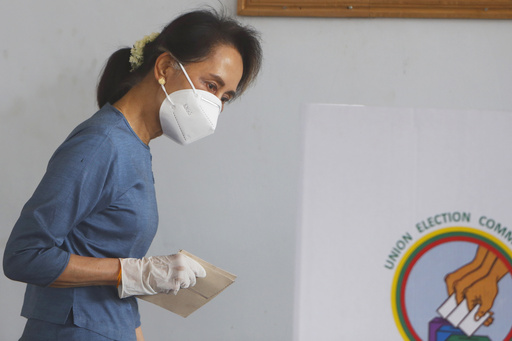BANGKOK — On Friday, the military ruling regime in Myanmar declared a further six-month extension to its emergency mandate as it prepares for elections anticipated to occur later this year, even though a specific date for the voting has yet to be disclosed.
The military had imposed a state of emergency on February 1, 2021, following the detention of Aung San Suu Kyi and several high-ranking officials from her administration, effectively reversing years of democratic progress that had followed five decades of military governance. This drastic move triggered a wave of armed resistance, with various ethnic militias and the civilian-backed defense forces now holding significant territories across the nation.
The junta currently finds itself confronting intense opposition, marking its most significant challenge since seizing control. While it has lost considerable ground, the military retains influence over central Myanmar and large urban centers, including the capital, Naypyidaw.
State-run MRTV reported on Friday that the National Defense and Security Council unanimously resolved to extend the state of emergency after Senior General Min Aung Hlaing asserted that additional time was necessary to restore order and facilitate the upcoming national elections. Although this council is officially recognized as an administrative body, it is essentially under military authority.
According to the military’s 2008 constitution, a one-year emergency rule can be followed by two six-month extensions before elections are required; however, the current extension marks the seventh occasion this period has been prolonged.
In a recent statement, Tom Andrews from the United Nations Human Rights Office highlighted four years of military repression, violence, and mismanagement that have driven Myanmar into a severe crisis. The UN estimates that over 3.5 million individuals have been displaced due to ongoing conflicts.
“Military forces have killed thousands of innocents, attacked and destroyed villages, and forced millions into displacement. Over 20,000 political prisoners are still incarcerated. Public services and the economy have deteriorated, leading to potential famine affecting swathes of the population,” Andrews stated.
Countries such as the United States, the United Kingdom, and the European Union have jointly denounced the military regime’s actions against civilians, noting that approximately 19.9 million people, or more than a third of the population, are in dire need of humanitarian assistance, including food security, while nearly 3.5 million remain displaced internally, an increase of nearly one million in just the past year.
Their joint statement, reflecting on the anniversary of the military coup in 2021, also raised alarms about escalating cross-border crimes like drug and human trafficking and online scams that not only affect Myanmar but also neighboring nations and overall regional stability.
“The trajectory we are observing is unsustainable, both for Myanmar and the surrounding region,” remarked the coalition of countries, which includes Australia, Canada, South Korea, New Zealand, Norway, and Switzerland.
The extended state of emergency allows Min Aung Hlaing to consolidate all branches of power—executive, legislative, and judicial—within the military. As per the constitution, governance responsibilities must be handed over to the president at least six months prior to elections.
Initially, the military had announced that elections would take place in August 2023 but have since postponed that date, suggesting they might occur in 2025. Critics argue the elections will not be conducted fairly or freely due to the absence of a free press and the incarceration of most leaders from Suu Kyi’s National League for Democracy (NLD). Many view this election strategy as a means for the military to establish legitimacy while ensuring the generals maintain power.
Moe Zaw Oo, a representative from the opposition’s shadow National Unity Government, conveyed on Wednesday that anti-junta factions are strategizing nonviolent tactics to resist the upcoming military-supervised elections. The NUG positions itself as the legitimate government of Myanmar and encompasses various opposition groups.
“No one affiliated with any organization among our revolutionary forces will recognize the illegal elections that the military aims to conduct. While there are differing views on various matters, our stance regarding this election is unified and unequivocal: we outright reject it,” Moe Zaw Oo stated during an online press briefing.
